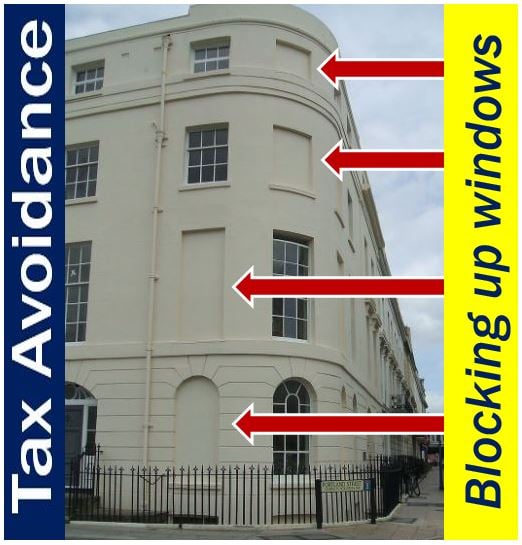Tax Avoidance refers to everything people and companies do legally to reduce their tax bill. If someone gets an accountant to go through their books and advise them on how to legally pay less taxes, the accountant is helping their client in their tax avoidance quest.
Put simply, it is the practice of using legal means to pay as little tax as possible.
Tax avoidance is legal
Tax avoidance, which is legal, contrasts with tax evasion, which is illegal. Tax evasion is the illegal practice of intentionally not paying taxes, i.e. the method used by the person, company or entity is against the law. If you never complete your tax return, when you know you should, you are probably guilty of tax evasion.
With tax avoidance, taxpayers are using tax law to obtain a tax advantage – a loophole – that the authorities had never intended. The term contrasts with tax planning, which uses tax reliefs that the government deliberately introduced to reduce people’s or company’s tax bills.
Imagine tax legislation is a shield. Tax avoidance involves finding the holes – loopholes – in that shield, and exploiting them. The aim is to pay as little tax as possible. Tax avoidance is legal. The lawmaker’s job is to plug those holes.
On its website, the British Government says that tax avoidance typically involves contrived, artificial transactions that serve no purpose (or very little purpose), other than to produce a tax advantage. The practice involves operating with ‘the letter of the law’, but not ‘the spirit of the law’.
The British Government adds: “Most tax avoidance schemes simply do not work, and those who engage in them can find they pay more than the tax they attempted to save, once HM Revenue and Customs (HMRC) has successfully challenged them.”
Ethical debates often arise around tax avoidance, as what is legal may not always align with what some consider to be socially responsible financial conduct.
Tax avoidance – keeping money offshore
Keeping money offshore is a common way celebrities, sports stars, world leaders, other rich individuals, and corporations avoid tax – often by setting up shell companies abroad.
International cooperation is crucial in addressing tax avoidance, as global initiatives and agreements aim to close cross-border loopholes and ensure fair taxation.
According to a report – ‘Broken at the Top‘ – issued by Oxfam America in April 2016, tax avoidance by multinational companies costs the United States about $111 billion annually, and is estimated to sap approximately $100 billion each year from poor nations.
Oxfam America wrote:
“US policymakers and a broken international tax system enable **tax dodging by multinational corporations, which contributes to dangerous inequality that is undermining our social fabric and hindering economic growth.”
** Tax dodging usually means tax avoidance (it can mean tax evasion, but this is less common).
America’s fifty largest companies have stored over one trillion dollars in offshore shell companies over the past few years, wrote Alexia Fernández Campbell in an article in The Atlantic.

Corporate tax avoidance
US corporate giants, including Apple, IBM, Walmart and Pfizer, have put away billions of dollars via over 1,500 subsidiaries in the Cayman Islands, the British Virgin Island, and other tax havens.
Although this activity is not illegal – tax avoidance is a lawful practice – keeping their profits offshore deprives the US Government of billions of dollars in income, which has to be collected from other taxpayers.
According to the US Securities and Exchange Commission filings, America’s fifty biggest companies made approximately $4 trillion in profit between the period 2008 and 2014. It is estimated that about one-quarter of that total has been kept outside the United States.
Even though the US corporate tax rate is 35%, Oxfam America calculated that those fifty corporations paid an average effective rate of 26.5%, compared to the average American worker, who paid 31.5%.
Smaller commercial enterprises that do not have the resources required to build complex tax-avoidance schemes end up paying a considerably higher percentage of their profits in tax than the fifty giants.
Deborah Field, a former corporate tax accountant who now runs a small business in Oregan, said:
“I’ve seen how much time and effort companies put into avoiding paying their taxes. It makes me angry.”
Ms. Field was invited to speak on a press call about Oxfam’s report.
Tax avoidance& evasion in context
Below are 4 example sentences containing the term “tax Avoidance” and 4 containing “tax evasion” to help you see how we can use them in context:
“Tax avoidance”
- “The new government policy aims to tighten regulations around tax avoidance by closing loopholes that allow multinational companies to shift profits to low-tax jurisdictions.”
- “Tax avoidance strategies, such as charitable donations and retirement savings contributions, are commonly employed by individuals seeking to minimize their tax liabilities within the boundaries of the law.”
- “During the financial audit, it was revealed that the corporation had been engaging in aggressive tax avoidance by utilizing complex offshore financial structures.”
- “Tax avoidance has become a contentious issue in the public eye, with debates focusing on the morality of legally minimizing taxes versus the obligation to contribute a fair share to society.”
“Tax evasion” or “evading tax”
- “The celebrity faced significant backlash and legal consequences after being convicted of tax evasion for failing to report substantial income to the IRS.”
- “Evading tax is a serious criminal offense that can result in hefty fines and imprisonment for those found guilty of deliberately hiding their taxable income.”
- “The Panama Papers leak exposed a global network of tax evasion, revealing how some wealthy individuals use offshore accounts to conceal assets from tax authorities.”
- “Investigators are cracking down on underground businesses that operate on a cash-only basis as a means of evading tax and bypassing legal financial reporting requirements.”
